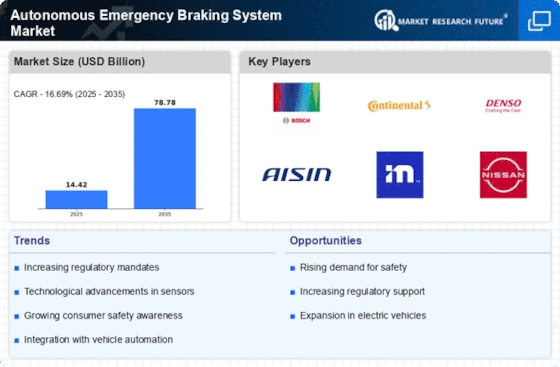Top Industry Leaders in the Autonomous Emergency Braking System Market

The Transformative Landscape of Autonomous Emergency Braking Systems (AEBS) Market: An Overview of Innovation and Growth
The Autonomous Emergency Braking System (AEBS) market, a subset of the Advanced Driver Assistance Systems (ADAS), is currently undergoing a significant transformation. Fueled by escalating vehicle safety regulations, a rising consumer demand for enhanced safety features, and rapid technological advancements, this dynamic landscape hosts a diverse array of players, each employing distinctive strategies to secure their share of the market.
Key Player Strategies:
Prominent players such as Continental AG (Germany), Denso Corporation (Japan), Robert Bosch (Germany), Valeo (France), Hyundai Mobis (South Korea), Autoliv Inc (Sweden), ZF Friedrichshafen (Germany), Hitachi Automotive Systems (Japan), Mando Corporation (South Korea), Aisin Seiki Co (Japan), and others dominate the market with their extensive experience, technological prowess, and established relationships with major automakers. These leading Tier 1 suppliers focus on continuous innovation, product diversification, and strategic partnerships to maintain their market dominance. A notable example is Continental's recent acquisition of EyeSight Technologies, an Israel-based computer vision expert, illustrating their commitment to strategic expansion.
In contrast, Tier 2 suppliers and startups, including Aptiv, Autoliv, Mobileye, and Velodyne, engage in fierce competition by concentrating on niche functionalities, cost-effective solutions, and partnerships with smaller automakers and new market entrants. An illustrative case is Mobileye's collaboration with Ford to equip six million vehicles with its AEBS technology, underscoring the efficacy of this strategy.
Traditional automakers like Toyota, Honda, and Hyundai are increasingly integrating AEBS as standard equipment across their vehicle lines. Motivated by safety regulations and consumer preferences, this integration is exemplified by Toyota's Safety Sense 2.0 suite, showcasing advanced AEBS capabilities.
Factors for Market Share Analysis: Several factors contribute to market share analysis, including technology leadership, cost competitiveness, regional regulations, and strategic partnerships. Companies with cutting-edge sensor technology, detection algorithms, and advanced processing capabilities, such as Bosch, hold a competitive edge. Autoliv's focus on scalable radar technology exemplifies the importance of cost competitiveness. Furthermore, compliance with regional regulations, like the European Union's mandatory AEB requirement for new vehicles by 2024, plays a pivotal role in market acceptance. Strategic partnerships, such as Hyundai Mobis' collaboration with Intel on advanced driver assistance systems, accelerate market penetration and open new opportunities.
New and Emerging Trends:
Overall Competitive Scenario: The AEBS market is marked by intense competition, with established players facing challenges from agile competitors and automakers. Continued innovation, strategic partnerships, and cost-effective solutions are pivotal differentiators. The market is poised for disruption, with emerging technologies promising to redefine the landscape. Companies that adapt to these changes and address evolving customer needs will gain a significant advantage in this high-growth market.
The pursuit of Level 3 and beyond autonomous driving capabilities will further reshape the competitive landscape, making the AEBS market an exciting space to watch in the coming years.
Industry Developments and Latest Updates:
Continental AG (Germany):
- October 26, 2023: Continental partners with Baidu Apollo to develop and integrate L4 autonomous driving solutions, including advanced AEBS for robotaxis.
Denso Corporation (Japan):
- November 30, 2023: Denso announces a new long-range radar system for AEBS, enabling earlier detection and improved braking performance.
Robert Bosch (Germany):
- June 21, 2023: Bosch unveils its upgraded iBooster technology, enhancing the responsiveness and effectiveness of AEBS systems.
Valeo (France):
- December 5, 2023: Valeo partners with Mobileye to develop and commercialize Level 2+ ADAS solutions, including advanced AEBS features.










